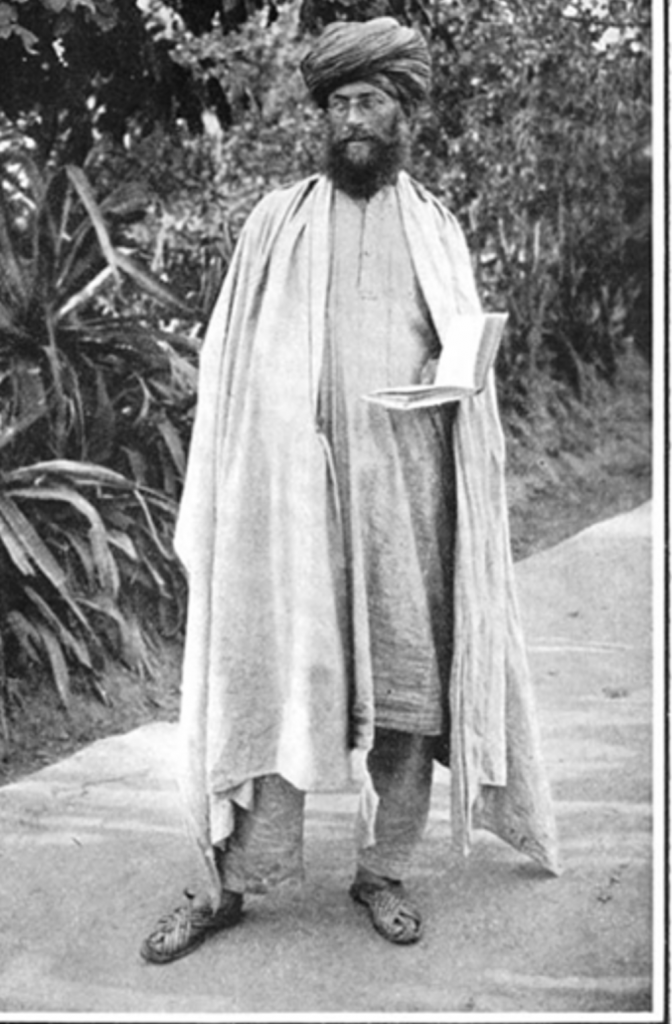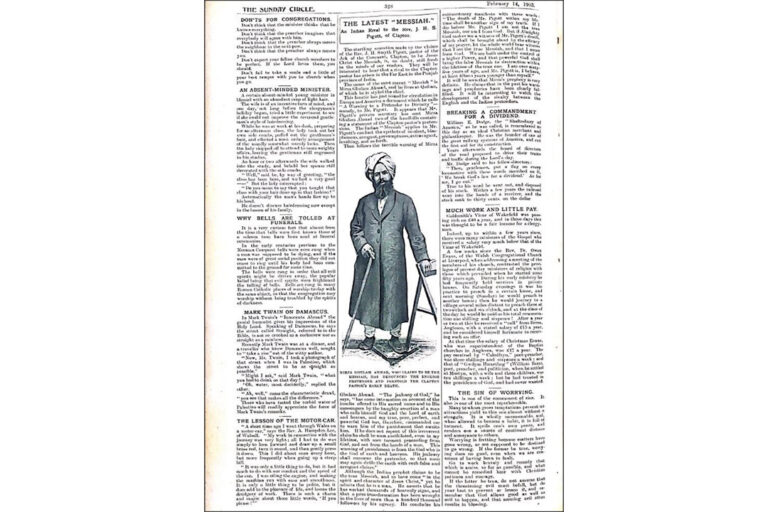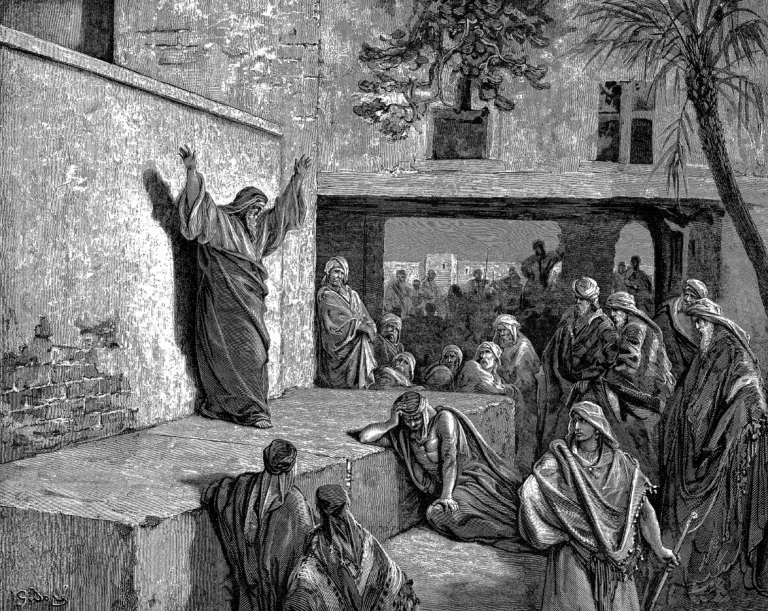
Dr Pennell an English protestant missionary visited Qadian.[1] He was a Church of England missionary appointed in Banu for 11 years, Dr Pennell arrived on his bicycle in Qadian as part of his travels with his disciple who he referred to as his son. He was dressed as a Sadhu in ocher-colored clothes, wearing a turban and traditional sandals. His appearance described in Al-Hakam corresponds directly with a picture of Dr Pennell in his book “Among the Wild Tribes of the Afghan Frontier” in which he describes some of his experiences during his travels including his visit to Qadian.
Hazrat Mufti Muhammad Sadiqra welcomed the missionary and from his appearance realised that he was an Englishman dressed in eastern clothes. Mufti Sahib started the conversation in English, but Dr Pennell responded in Urdu. Dr Pennell was fluent in Urdu and Pashtu and he requested a meeting with the Promised Messiahas. Due to the ill health of the Promised Messiahas the meeting was not possible.[2]

Hazrat Mufti Sadiqra learned that the Dr Pennell was meeting with elders and leaders of the Hindus and the Muslims. Mufti Sahib urged him to stay longer than a day so when the Promised Messiahas felt better a meeting might be possible. Dr Pennell was unable to remain longer than a day. So Hazrat Mufti Sahib presented the claims of the Promised Messiahas and his signs. Dr Pennell also had the opportunity to listen to a Dars-e-Hadith[3] by Hazrat Khalifatul Masih Ira, who was expounding the science of Ahadith in respect to their collection through a chain of narrators. He described it as distinctive from the narrations of any other faith because to be able to name each narrator and to trace the statement back to the original source with due diligence and care is only found in Islam. On the contrary other faiths when mentioning a narration by a narrator who may have appeared centuries after the original source do not mention the chain of narrators which makes the truthfulness of the statement doubtful. Throughout the Dars, Dr. Pennell could be seen nodding his head in approval at what was being said.[4]
Dr. Pennell recalls his visit to Qadian in 1909:
“Passing over our stay here and at other intervening places, I might mention our visit to Gadian[5], rendered famous by being the headquarters of the Muhammadan reformer Mirza Ghulam Ahmad, who died in 1908. This man had collected round him a band of zealous followers…. Heavy rain-clouds were overcasting the sky when we set out, and we had scarcely covered the eleven miles of unmade road that connects Batala with Gadian when the downpour commenced, and continued throughout the day. Moulvi Muhammad Sadiq, the head-master of the Mirza’s High School, received us with the greatest courtesy, and gave us one of the schoolrooms to rest in, and shortly afterwards, as the Mirza himself was indisposed and unable to see us, we were taken into the presence of his lieutenant, Moulvi Moha-ud-din[6]. This Moulvi is very learned, probably the most learned in Gadian; he comes from the town of Bhera, in the Panjab, but has travelled a good deal. He was teaching theology to a large class of youths and men in Eastern fashion, reclining on a simple mat and cushion himself, while his pupils sat on the ground round him. Tea was brought in for us and him while he went on teaching. The Hadis from which the pupils were reading was on the subject of prayer, and the Moulvi explained the passages with great force and perspicuity as the pupils read them out turn by turn. After some dissertation on the correct intonation of prayers, he took up (probably for our benefit) a comparison of the texts of the Quran and the Bible, showing how the custom of committing the former to memory had resulted in its verbal correctness. Following the same line, Muhammad Sadiq compared with this the recent criticisms on the Bible by the Christian expositors; and the “Encyclopædia Biblica,” which he seemed to have studied minutely, afforded him an inexhaustible store of argument…. I was shown the high school, college classes, and boarding-house. Though the buildings for the latter were second-rate, yet the management seemed good, and the inmates orderly and well trained. In particular, I noticed that, though the next morning was chilly and drizzly, yet all were up at the first streak of dawn, and turned methodically out of their warm beds into the cold yard, and proceeded to the mosque, where all united in morning prayers, after which most of them devoted themselves to reading the Quran for half an hour to one hour. Many of the masters, too, seemed very earnest in their work, and had given up much higher emoluments to work for quite normal salaries in the cause to which they had devoted themselves…. We were disappointed, too, in receiving a message that the Mirza was still too unwell to see us, but would do so in the morning. However, when morning dawned, we heard with much regret that he had passed a bad night and was still unable to see anyone. As his attendants were unable to hold out any prospect of a speedy interview, and as, indeed, we felt doubtful whether the interview was desired, We had been kindly and hospitably received, and there was something inspiriting in seeing a number of educated men thoroughly zealous and keen in the active pursuit of religion, though the strong spirit of antagonism to Christianity was saddening”[7]
This account was also later published in his biography “Pennell of the Afghan Frontier, The Life Of Theodre Leighton Pennell” by Alice M. Pennell.[8]
The Promised Messiahas would never avoid a meeting which would result in conveying the message of God to the people as is evident from the arrival of various people to Qadian. Not only that they were welcomed and hospitably received, but they were always requested to stay longer in order to understand the claims of the Promised Messiahas. In the case of D.D. Dixon, he was also asked to stay longer at Qadian by the Promised Messiahas. The Promised Messiahas on the 18th Nov 1901 when leaving for a morning walk addressed Mr Dixon and said: “It is our heartfelt desire that you stay a few days more with us. So that I may explain to you the true Islamic Philosophy Which God has bestowed upon me and is hidden in this age.”[9] But because Mr Dixon had to leave, the Promised Messiahas accompanied him to about four miles outside Qadian explaining to him the details of his claims and the beauties of Islam.
Dr. Pennell made an unannounced visit to Qadian at a time when the Promised Messiahas was ill. Al-Hakam 10 January 1904 P.16 reports that Dr. Pennell had been urged by many members of the community to stay in Qadian for longer. He was visiting holy men of various religions, and in terms of his claim and his influence, the Promised Messiahas and his community. were incomparable and unique. It is reported Dr. Pennell had decided that he would not be able to stay longer than a day, as he could not alter his plans therefore he left the next morning without meeting the Promised Messiahas.
It is due to the missed opportunity that he writes:
“This man had collected round him a band of zealous followers, but, unfortunately, the good he might have done was nullified by his impious claim to be the returned Messiah, in accordance with which he professed miraculous powers, and demanded a correspondingly abject obedience…Moreover, one could not but feel that, as in similar cases in England and America, here was a man of great ability who had effectually deceived himself, and had then been the means of deceiving a multitude of others into believing his false claims. As we read in Matthew xxiv. 11, “False prophets shall arise and shall deceive many.”[10]
Dr Pennell left with misconceptions about the claims of the Promised Messiahas and his accusation of “antagonism to Christianity”. A thorough study of the teaching of the Promised Messiahas clearly demonstrates that he was responding to the vilifying attacks on Islam and on the Holy Prophetsa by Christian missionaries through press and lectures which could be constantly witnessed throughout India.
The antagonist approach of Christian missionaries towards Islam far outweighed the response they received from the Promised Messiahas. Dr Pennell’s criticism of the Messianic claim of the Promised Messiahas was due to his belief in the future physical return of Jesusas contrary to what Jesus himself understood about the return of prophet Elijah. Jesus declared that the return of Elijah before the descent of Messiah, was to be fulfilled in the person of John the Baptist. The coming of false prophets does not negate the coming of a truthful one because in the same Matthew Jesusas also says that a tree is known by its fruit. Thus, to compare the Promised Messiahas to other claimants of the time is a false equivalence because the community of such claimants died with their passing away, yet the Ahmadiyya Muslim Community established over 133 years ago by the Promised Messiahas still flourishing and prospering.
[1] Al Hakam 10 January 1904
[2] Ibid
[3] Commentary on the sayings of the Holy Prophet.
[4] Al Hakm Qadian, 10.01.1904, p.16. / 17.01.1904, p.10.
[5] typo, means Qadian
[6] Referring to Hazrat Maulana Nooruddinra
[7] Among the Wild Tribes of the Afghan Frontier P.248-250 By T. L. Pennell
[8] Pennell of the Afghan Frontier, The Life Of Theodre Leighton Pennell P.218-221
[9] Malfuzat Vol 2 P.347 18 Nov 1901 (Edition 2016)
[10] Among the wild tribes of the Afghan frontier by Pennell, T. L. P. 247-249



Very nice mashallah great asset 👍👍👍